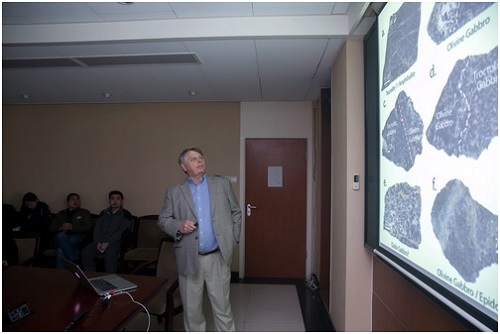Upon invitation of LIU Chuanzhou, a research fellow from the State Key Laboratory of Lithospheric Evolution, Prof. Henry Dick, a senior researcher from Woods Hole Oceanographic Insinuation (WHOI), visited our institute for academic exchange.
Prof. Henry Dick has been engaged in the formation and evolution of oceanic lithosphere for many years, and is a renowned expert in international academic circles related to marine geology. Since 1976, he has participated in more than 30 marine scientific investigations, among which he presided over 15 voyages as chief scientist. He was elected as a fellow of GAS and AGU, and received the AGU Harry Hess prize. He has published more than 150 SCI research papers, with a total citation number of over 8000. In particular, one of his papers published in CMP in 1984 has been cited more than 1100 times, and another paper published in JGR in 1990 has been cited over 900 times. Both of these are regarded as classic papers in the field of mantle petrology.
During the visit, Prof. Henry Dick gave an academic report entitled ‘Lithospheric overturn at ocean ridges: insight from the dike-gabbro transition’. The report detailed the intercalated relationship between diabase and gabbro in mid-ocean ridges, and pointed out that this relationship is inherently connected with the ocean ridge’s expansion rate. More specifically, in rapid-expansion ridges, the gabbro invades upward and then assimilates and contaminates the overlying diabase walls, while in slow-expansion or ultra-slow-expansion ridges the diabase invades gabbro. Through comparison with ophiolite, he stressed that the intercalated relationship between diabase and gabbro can be effectively used for estimating the formed tectonic environment of ophiolite. After the report, Prof. Henry Dick led a heated discussion with the participating teachers and students.
In addition, Prof. Henry Dick also visited the Laboratory of Secondary Ion Mass Spectrometer, the Laboratory of Multiple-collector ICPMS, and the Laboratory of Rare Gases.

Prof. Henry Dick gives an academic report